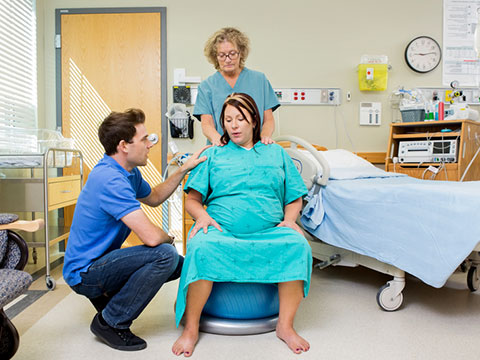Maternity admission
 Once your labor begins you are not going to have the time or the inclinations to arrange your stay at the hospital. That is why it is best that you prepare for your stay beforehand. Today, most women give birth at the hospital where their doctor or midwife has admitting privileges. Keep in mind that when you choose a doctor or midwife, in most cases you’re choosing the place of birth. In large cities with several hospitals, chances are that the caregiver will have privileges at more than one hospital. In this case, you may be able to choose the hospital where you would prefer to have your baby. If you live in a small town, there may only be one hospital available.
Once your labor begins you are not going to have the time or the inclinations to arrange your stay at the hospital. That is why it is best that you prepare for your stay beforehand. Today, most women give birth at the hospital where their doctor or midwife has admitting privileges. Keep in mind that when you choose a doctor or midwife, in most cases you’re choosing the place of birth. In large cities with several hospitals, chances are that the caregiver will have privileges at more than one hospital. In this case, you may be able to choose the hospital where you would prefer to have your baby. If you live in a small town, there may only be one hospital available.
When it comes to labor and delivery all hospitals are not created equal. This is one area of healthcare where hospitals vigorously compete to set themselves apart from the competition. Many offer different room amenities and childbirth and education classes for family members, including grandparents and siblings.
Once upon a time, having a baby involved moving the laboring mother to and from many different rooms. She would labor in a labor room, deliver in a sterile surgical-style delivery room, and then recover in a postpartum room as her newborn baby was whisked off to the nursery for several hours. Today, the availability of birthing rooms in many hospitals makes it possible for mothers to stay in the same bed from labor through recovery, in some instances for their entire hospital stay, and for their babies to undergo any post-delivery care in the room with them until both are discharged to go home.
Birthing rooms are fully equipped for standard, complication-free deliveries. Many look like a cozy bedroom or hotel room and may feature soft lighting, artwork, curtains on the windows, a rocking chair or a recliner, and a soft comfortable bed that converts to a birthing bed.
In most hospitals, a new mother and her baby (if she chooses the rooming in option) are moved from the birthing room to a postpartum room an hour or so after delivery. This gives the new family plenty of uninterrupted time to bond and fall in love with their new baby. Some very progressive hospitals will allow the father and siblings to share the room with the mother and baby for the entire hospital stay.
Birthing rooms are a very popular amenity and, at many facilities, the demand for them far exceeds the supply of rooms so they’re often assigned on a first come, first served basis. It’s a smart move for an expectant mother to check her hospital’s policy and find out how many birthing rooms they have so she won’t be disappointed when it’s time to deliver her baby.
Touring the birth room
The birth unit may offer tours or you can call the hospital and arrange a tour. This is good to plan when pre-registering. Each medical center has different atmospheres and room arrangements.
- LDRP‘s are a labor, delivery, recovery, and post partum suite. Single room maternity care is where you are admitted to a birth room, labor, give birth and stay until you go home.
- LDRs are a labor, delivery, and recovery suite. You and your baby will be moved to another room for your mother/baby care.
Labor & Delivery Rooms are a traditional birth suite. You will labor in one room then be moved by bed or stretch into a delivery room and then after the baby is born be moved to another room for your recovery.
Touring the birth unit may give you a sense of ease and comfort on knowing where to go when you arrive at the hospital in labor and an opportunity to ask the nurses questions about your stay. If you are unable to tour the birth unit, you can call the hospital and ask where to go when you’re in labor.
When comparing the labor and delivery departments of different hospitals don’t forget to ask these questions:
- How many support people are allowed to be present for the labor and delivery? Birthing partners and husbands will certainly be welcomed in any labor and delivery department, but what if a mother wants her best friend, a sister, a doula or anyone else present? Make sure early in pregnancy that the setting will meet your needs.
- Does the hospital offer birthing rooms or can labor and delivery take place in the same room?
- What is the hospital’s policy on sibling visitation? Can siblings be present at the birth?
- What is the visitation policy for other relatives and friends?
- Does the hospital offer “rooming in,” when the baby can stay in the mother’s room rather than being taken to the nursery?
- Are rooms in the labor and delivery unit private or semi-private? Are private rooms available? Some insurance policies only allow for a semi-private room so check before it’s time to go to the hospital.
- Does the hospital offer in-house support such as a lactation consultant?
- What floor are the birth rooms on?
- Where do we park?
- Do we go to the Emergency Department or go directly to the birth unit?
- Do I have to notify my doctor before coming to the hospital?
One thing nice about calling the hospital is that the nurses are there 24 hours a day, seven days a week. And you can call any time.
Other important things to do:
It will be a good thing to decide who is going to drive you to the hospital. It is important to determine the best route. Above all, do not try a new route on the day of your labor!
By this time you should have a car seat for your baby because the hospital will not let you take your baby home without one. Make sure you know how to install it correctly, according to the manufacturer’s instructions. If you have other children or pets, establish a plan for their care while you are in the hospital.
You should speak to your baby’s pediatrician to determine what supplies you will need for your baby once he or she comes home. If you decide to breastfeed, the hospital usually has a class for new mothers. It would be best to look into it before your baby is born. That way you will be prepared and relaxed during your first breast feeding session. You will need to tell your healthcare provider if you are gong to breastfeed so that they will not give you medication to stop the production of your breast milk.
If you are working it will be possible to give an approximate time of when you will be leaving to have your baby. Find out any and all emergency numbers. Does your healthcare provider want you to go directly to the hospital or should you call him first?
Last but not least: pack a bag for yourself and your baby. You may want a nightgown, slipper, toothbrush, toothpaste, shampoo, and even a blow dryer. Do not forget to bring clothes home for the baby. If you have a dog at home you may want to send home the baby’s blanket that he or she may be using so that the dog will have an idea about the new arrival. It is best to do this before baby comes home.
Hospital admission & legal matters
Every hospital admits patients differently. Every time you are admitted you may be asked fill out papers. The hospital has a form for this and may ask you to read and sign it. Almost all hospitals want you to pre-admit long before your due date, so that when the time comes for your delivery all the paperwork is ready to go. That way you will not have to worry about any of those issues. When you pre-register to your hospital it is similar to making hotel reservations. When you do go into labor, you may forego the admitting procedure and only concentrate on getting settled.
Also it is important that you know what your health insurance requires from you during your hospital stay.
Arriving in labor at the hospital
When you arrive at the hospital, you will be asked questions about the length and strength of your contractions and whether your water has broken. The staff will ask you to undress and put on a gown. You will be given an internal exam to determine how far your cervix has dilated. You will also be monitored for temperature, blood pressure, and pulse. You may have a fetal monitor attached to your abdomen. This will be monitoring your baby’s heartbeat and will let your healthcare provider determine if your baby is showing signs of stress. You will also be asked to give a urine sample so that it may be tested for proteins and sugar.
If you find that you do not understand what is happening or are uncomfortable with some of the procedures please talk to the staff. They are there to make you feel comfortable and as relaxed as possible during this beautiful yet stressful time. Good Luck!






